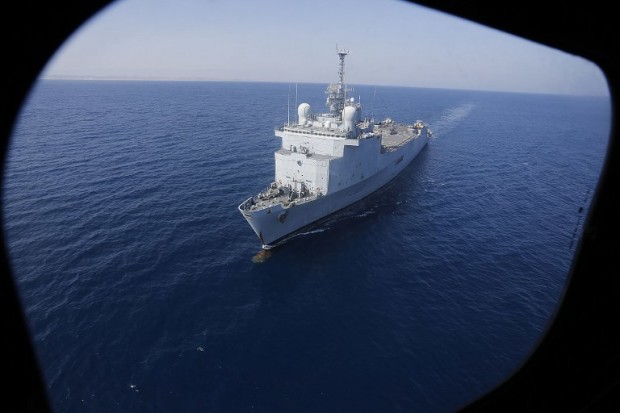
The FS Sirocco seen on patrol on March 27, 2014 from a French army helicopter off the coast of Somalia’s northern semi-autonomous region of Puntland as part of the European Union Naval Force (EUNAVFOR-Somalia) combating piracy. The presence of an international armada of navy ships have virtually wiped off piracy in the Gulf of Aden and off the Somali coast even though the threat still looms. At the height of Somali piracy in 2011 , the International Maritime Bureau (IMB ) had recorded 237 attacks attributed to Somali pirates across the Indian Ocean. AFP
MOGADISHU, Somalia — Suspected pirates boarded an oil tanker and forced its Sri Lankan crew to change course towards the northeastern Somali coast, in what could be the first such attack since 2012.
The armed men then demanded a ransom for the ship’s release, according to the EU Naval Force who established contact with the oil tanker.
After sending a distress signal on Monday afternoon, the assailants boarded the Aris 13, taking its eight crew members hostage and forcing the vessel to change course.
“What we know for sure is that a small tanker has been attacked and has diverted,” John Steed, a former British army officer who heads the Horn of Africa section of the Oceans Beyond Piracy NGO, said Tuesday.
“Whether this is a pirate attack needs to be confirmed. We do not know what the demands of those men are. But this looks pretty much like the old piracy attack scenario,” he said.
Earlier reports said the vessel was Sri Lankan-flagged, but the foreign ministry in Colombo denied the claim.
“The ministry is taking action to verify the alleged incident, and initial enquiries have revealed that while the vessel involved is not registered under a Sri Lankan flag, it has an eight-member Sri Lankan crew,” it said in a statement on Facebook.
According to the Marine Traffic website, which lists the movements of ships around the globe, the Aris 13 is a Comoros-flagged vessel.
Contact made
The EU Naval Force, the bloc’s counter-piracy military operation, said late on Tuesday that its headquarters in London was able to make telephone contact with the ship’s master.
“The master confirmed that armed men were on board his ship and they were demanding a ransom for the ship’s release,” a statement said.
The tanker was carrying fuel from Djibouti to Mogadishu when it was seized.
“Yesterday afternoon, the ship reported that it was followed by two skiffs. After that, it went silent and the owner of the ship was not able to get into contact,” said Steed.
“There has not been an attack of a commercial ship by Somali pirates since 2012,” he added.
The Aris 13 was reportedly forced to dock near the town of Alula on the Somali coast.
“Armed men are holding the boat and its crew near Alula,” Muse Mohamed, a coast guard official in northeastern Somalia’s semi-autonomous region of Puntland, told AFP.
A traditional chief in the region, Abdihakim Mohamed Jama, contacted by telephone said more than 20 men, heavily armed, were on board the tanker and that the suspected pirates “are claiming to be fishermen”.
Somali pirates began staging waves of attacks in 2005, seriously disrupting a major international shipping route.
In 2012 the trend cost the global economy $5.7 billion to $6.1 billion (5.4 to 5.7 billion euros), prompting interventions by the United Nations, the European Union and NATO.
Many commercial shippers began hiring private armed guards for their vessels.
At the peak of the piracy crisis in January 2011, 736 hostages and 32 boats were held.
Though anti-piracy measures ended attacks on commercial vessels, fishing boats have continued to face attacks. CBB